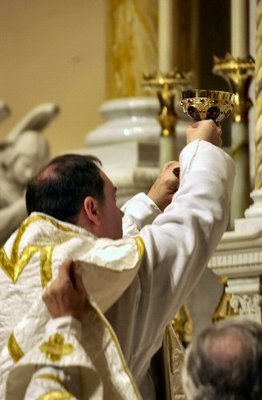Wednesday, May 20, 2009
MY FIRST AWARD IN YEARS
Paul mentioned the school Mass situation she had experienced. For most Catholic schools this is a travesty.
At our local Cathedral, evidently the school kids (perhaps all the school "choirs" - a word I use lightly here) fill the loft, with the 90+ rank pipe organ. What do you think they have for accompaniment???????
GEEEEEEEEEEEEEEEEEEEETTTTTTAAAAAAAAAAAAAARzzzzzzzzzzzz.
When my pastor told me this, I just went into my arrogant self-aggrandizing mode and said, "THEY can do that. WE will not! Our children will be accompanied by the organ, nothing else." Then suggested that we invite Bishop Rene Gracida, Bishop emeritus of the diocese, to come here for a special Mass. He and the emeritus are on good terms, and that suggestion may come to fruition. There are those who might think that the emeritus Bishop is arrogant, etc., but he does expect good music, support his priests, etc.
I for one, will look forward to such a celebration at our humble parish. We will have, as usual, excellent participation, excellent altar servers, excellent lectors, (hopefully by then) an excellent choir to sing something special (a choral work not by Haugan-Haas Ice Cream Co., the St. Louis Jesuits, the Daymeans, etc., but perhaps, Faure, Bach, Mozart, or Langlais, Dupre, etc.). We will have incense, high ritual celebrated with great dignity and respect for the Triune God who has created us and given us a wonderful Church, by the suffering of Jesus Christ. And we will have a great attendance, as well.
And of course, other local parishes and schools who have liberalism in all their program and liturgies, mush for thinking and ignorance of staff, trash as music, will all be strangely absent from the experience. Deo Gratias.
And, probably, Ad orientem !!!!!!!
I'll let you know - we'll video tape it and post it to the site!
SteveO
Sunday, September 7, 2008
THE PILOT AND THE BUS DRIVER...
In a letter written to Fr. Z:
BTW, people loved the analogy of the airplane pilot and the bus driver. [Good tip for priests.] Are they turning their backs on the passengers OR are they facing the same direction as everyone else in the hope of arriving at the same destination?
(The red is added by Fr. Z.)
I like it!
Another reason why the driver/pilot would face the same direction is that if they faced the people (the passengers), they're very likely to crash. By facing the same direction as the people while saying Mass, the liturgy is being steered in the right direction.
Peace,
BMP
Saturday, May 10, 2008
GUESS WHAT! TEENS GET IT!
Read the conversation here.
Peace,
BMP
Friday, January 25, 2008
HOW TO GET YOUR BACK TURNED UPON
Any religion reporter who trots out the canard “the priest turns his back to the people” when describing the celebration of Mass ad orientem is a religion reporter to whose work I can turn my back.
I like that one!
Peace,
BMP
Monday, January 21, 2008
AD ORIENTEM = UNITY!
Here he writes:
Respectfully, it seems that the proponents of both sides of this discussion have missed an important point. The priest standing at the altar in the position prescribed by the 1962 Roman Missal is not "turning his back of the people", but "standing with the people in prayer". When he says, "Te igitur, clementissime Pater ... rogamus, ac petimus, uti accepta habeas et benedicas haec + dona, haec + munera, haec + sancta sacrificia" illibata ... " [We therefore humbly pray and beseech you, most merciful Father ... to accept and bless these + gifts, these + presents, this holy and unblemished Victim ..." he is not speaking in some form of the royal We", but uniting himself with the members of the congregation in the normal grammatical first person plural: We, not Me!
On the other hand, the priest who stands behind the altar facing the congreation, is, by his stance, separating himself from the people for whom he is celebrating the Eucharist, not uniting himself with them.
OK - he's not conservative, but he gets it. And I have a gut feeling more and more priests are beginning to get it. I may, soon enough, get to play/sing/direct choir for an Ordinary Form Mass ad Orientem!
The priest in question here, btw, goes under the name Fr. John L, and runs a blog called Bear Witness to the Light.
Peace,
BMP
Monday, January 14, 2008
THE SCOOP AT ROTO-REUTERS...
At least that's what Reuters said. Get some hot water! Get some disinfectant!
VATICAN CITY (Reuters) - Pope Benedict celebrated parts of Sunday's Mass with his back turned on the congregation, re-introducing an old ritual that had not been used in decades.
Never mind facing the Lord, or facing the same direction as the people. That wouldn't be newsworthy, at least not for the folk over at Roto-Reuters.
The Carolina Cannonball gives this accurate report:
In other news... Reuters hires trained monkey reporters.
Peace,
BMP
Thursday, March 8, 2007
LATIN MASS A GROWING COMMODITY
Fr. Gonzales has the goods. Novus Ordo Latin. Tridentine Latin. Novus Ordo celebrated ad orientem. You name it, Phoenix has it! Kudos!
Peace,
BMP
Thursday, February 8, 2007
AD ORIENTEM IN THE LOCAL PAPER
Peace,
BMP
+++++++++++++++++++++++++++++++++++++++++++++++++++++++++++++
Liturgical orientation worth the discussion
By George Weigel
As discussion of deepening the church's liturgical reform unfolds, a lively conversation will likely revolve around be the question of orientation during Mass: might priest and people face in the same direction, toward the Holy Trinity, during the celebration of the eucharistic liturgy? Father U. M. Lang of the London Oratory has done that conversation a good service with his book, "Turning Towards the Lord: Orientation in Liturgical Prayer" (Ignatius Press). Among Father Lang's interesting points:
- The question at issue is not so much the celebration of Mass facing the people as the orientation of liturgical prayer. Thus attempts to derail this discussion by dismissing it as a project of anti-Vatican II reactionaries eager for the priest to turn his back to the people should be resisted. As Father Lang writes, "this cheesy sound-bite is a classic example of confounding theology and topography, for the crucial point is that the Mass is a common act of worship where priest and people together, representing the pilgrim church, reach out for the transcendent God."
- This, in fact, is one of the primary purposes of the eucharistic liturgy: it is meant to point Christian existence toward Christ coming in glory. This goal can be lost in what sometimes seems the closed circle of our present orientation. "That loss can lead, in turn, to what Father Lang calls "an eschatological deficit in the liturgy"
- a deficient sense of liturgical prayer as our privileged participation in the heavenly liturgy, which anticipates Christ's coming in glory.
- This common orientation of priest and people toward Christ, returning in glory, is deeply rooted in the origins of Christianity. Then, it was a matter of course for Christians to turn in prayer toward the rising sun
- an orientation that was a symbol of Christ, the light of the world, and of the church's hope for the Lord's return and the inauguration of the Kingdom of God in its fullness. (Interestingly enough, Islamic polemicists criticized Christians for this, claiming it was a return to pagan sun-worship.)
- In addition to this Kingdom-meaning of priest-and-people looking together toward the returning Lord, common orientation during the eucharistic liturgy also symbolized, once, the journey of the pilgrim people of God towards the future. It's worth discussing whether our present orientation contributes to a loss of the congregation's self-awareness as God's people on pilgrimage, through history, toward God's promises.
- The office of the priest, not his personality, is what counts - or what should count. Thus, the priest facing the same direction as the faithful when he stands at the altar, leads the people of God in a common movement toward the Lord, who is the rising sun of history. Practically, what does this mean? That consideration should be given to celebrating the Liturgy of the Word with priest and people facing each other (an orientation appropriate for listening and for teaching/preaching). Then, for the Liturgy of the Eucharist in the strict sense, in particular for the canon, it is more fitting that the whole congregation, including the celebrant, be directed toward the Lord, and that is expressed by turning toward the altar, with the priest leading the congregation in the eucharistic prayer as all face together toward Christ, whose coming is foreshadowed in his eucharistic presence.
Can't be done? Each summer, during the Tertio Millennio Seminar on the Free Society, that's precisely how we do it in the St. Hyacinth Chapel of the Dominican basilica in Krakow. There, for reasons of space, a free-standing altar is impossible. Yet no one thinks that the celebrant is turning his back to the people; everyone instinctively understands that, together, we are turning toward Christ.
The liturgy can be reverently celebrated with priest and people facing each other; that, too, happens in Krakow every summer - and in many other times and places, of course. The question is whether recovering the church's ancient practice of a common orientation of priest and people during the eucharistic liturgy wouldn't make such reverent celebrations more likely, while helping the church recover the kingdom aspect of its eucharistic life. That's worth a serious discussion.
Thursday, January 11, 2007
FATHER, LOOK EAST
A commenter under the name Hebdomedary, in Fr. Zuhlsdorf's post about priests who want tradition but remain versus populum, wrote a really cool parody hymn text dedicated to the desire for Mass to be said ad Orientem.
Hat tip to Fr. Richtsteig, the "orthometrist".
1. People look East! A man sits there. Tabernacles were located where
Tables were made, gradines were blunted, Christ our Lord off to the side was shunted.
People look East at mass today; See the fashions of the day.
2. When you pray, reach your hands aloft! Seems God’s arms aren’t long e-noff!!
Pop music’s nice in any weather; Chant is good, but our sound-system is better.
Liturgies change each day or two, That’s the fruit of Vatican II.
3. Father turn East, you’ll miss the spate Of the faithful who come to mass late.
Send a mes-sage to those who back-slide, Dir-rec-tion-al-ly show to them your back-side.
Turn to the East, as if to say “Sixties’ laxity’s passing away!”
4. Turn to the East! The time has come; Put “Lay Ministers” under your thumb!
Prayerful intents beat fascination With so-called active participation!
Father turn East at mass today. Versus Populum’s clearly passe!!
Tune: Besançon Carol, Traditional French.
BTW, Fr. Z's post itself is an excellent explanation as to why those priests who really want to go ad orientem won't (yet).
Wednesday, December 27, 2006
FOX ON THE TRADITIONAL LATIN MASS
Fox St. Louis gives us this report on the return of the Traditional (1962 Missal) Latin Mass. What I thought was a great gesture for secular media was the reporter saying that the priest faces God and not the people, instead of saying the priest turns his back on the people.
Of course, the Missa Normativa can also be celebrated ad orientem (facing God and not the people). In both the Traditional and the Normativa (when said ad orientem), there are brief instances where the celebrant would face the people (Dominus vobiscum, Orate Fratres, Ecce Agnus Dei, Ite Missa est).
Side note: unfortunately the organ featured in the story sounds like a Hammond, but I'm optimistic as that particular congregation grows, there will likely be a better organ.
Peace,
BMP
Monday, June 19, 2006
AD ORIENTEM versus VERSUS POPULUM
Same thing goes for the terms ad Orientem and versus populum. Of course, ad Orientem (to the East) on one front means facing the Lord with everybody else, while the other front tries to downplay it by saying "the priest has his back to the people". A similar situation with versus populum (facing the people). One front will take it as a positive: the priest's dialog face-to-face with the people, while the other front will say "the altar has become a stage". In the case of the latter, I've known many a priest over my quarter-century as an organist who have done just that - turn the altar into a stage.
Read on. It's an excellent read. Also, check out Diane's Te Deum Laudamus blog. You can usually find a good share of photos of Mass at Assumption Grotto in Detroit - Novus Ordo Missa done ad Orientem, with class!
Peace,
BMP
Monday, May 1, 2006
GIRM 299
Peace,
BMP
Wednesday, April 19, 2006
THIS IS IMPRESSIVE, BUT...
 Sounds like a new butter product by Kraft, doesn't it? But it's not. It's the Missa Normativa celebrated so well that you won't believe it's not Tridentine either!
Sounds like a new butter product by Kraft, doesn't it? But it's not. It's the Missa Normativa celebrated so well that you won't believe it's not Tridentine either!It is true! Missa Normativa CAN be celebrated ad Orientem!
Take a look at these photos, courtesy of Gerald at The Cafeteria Is Closed!
 Assumption Grotto, Detroit MI
Assumption Grotto, Detroit MI(Detroit is also home to such beautiful churches as St. Josephat, St. Joseph, and Sweetest Heart of Mary)
More impressive Assumption Grotto pictures at Gerald's blog
 Saint Agnes Church, St. Paul MN
Saint Agnes Church, St. Paul MN(This church was The Good in a previous episode of The Good, the Bad, and the Ugly, which aired on the Christus Vincit Podcast, episode #21)
More impressive St. Agnes pictures at Gerald's blog
And music? Done with class! Chant, polyphony, all things truly Catholic!
Peace,
BMP
Saturday, May 21, 2005
TURNING TOWARDS THE LORD
Now, a literal explanation of "ad Orientem" is in order here. "Ad Orientem" is Latin for "to the East". However, in the context of liturgical prayer, we don't mean this as the 90 degree mark of the compass. Otherwise, many would be really celebrating, perhaps to the south, or maybe a couple of degrees short of north-northwest. What we really mean here is the Liturgical East - to the Lord (his native land, of course, is in the Middle East).
Until the Second Vatican Council, the Mass was celebrated with the priest facing the Lord - to the Crucifix or perhaps the Tabernacle (many traditionally built churches with high altars still keep the Tabernacle in the center of the high altar, if it hasn't yet been mistakenly been torn down). Since then, there was this big craze - the claim that Mass HAD TO be said with the priest facing the people.
Until this phenomenon came up:
http://www.adoremus.org/0405LiturgicalPrayer.html
You see, Mass CAN be said facing the people, but it doesn't have to be. The Council DID ask for free-standing altars, preferably away from the wall, "so that one can easily walk around the altar and celebrate facing the people." (translated from "Sacra Congregatio Rituum, Instructio ad exsecutionem Constitutionis de sacra Liturgia recte ordinandam 'Inter Oecumenici'", AAS 56 (1964): 898, no. 91.)
Incidentally, my pastor has been reading then-Cardinal Ratzinger's book, "The Spirit of the Liturgy". I may pick up that book soon myself.
I'm going to call the following paragraph to the article linked above to your attention:
So, with that in mind, how's this sound for a new pattern of the "ad orientem Novus Ordo Missae"?"The rubrics of the renewed Missale Romanum of Pope Paul VI presuppose a common direction of priest and people for the core of the Eucharistic liturgy. This is indicated by the instruction that, at the Orate, fratres, the Pax Domini, the Ecce, Agnus Dei, and the Ritus conclusionis, the priest should turn towards the people. This would seem to imply that beforehand priest and people were facing the same direction, that is, towards the altar. At the priest's communion the rubrics say "ad altare versus", which would be redundant if the celebrant stood behind the altar facing the people anyway. This reading is confirmed by the directives of the General Instruction, even if they are occasionally at variance with the Ordo Missae. The third Editio typica of the renewed Missale Romanum, approved by Pope John Paul II on April 2000 and published in spring 2002, retains these rubrics."
Sign of the Cross and Greeting: facing the people
Penitential Rite or Sprinkling Rite, Gloria (if liturgically allowed), and Opening Prayer: facing the Lord
Readings and Homily: facing the people, at the pulpit (Note: the Psalm and Alleluia should still be sung from the ambo if possible)
Credo: facing the Lord
Prayer of the Faithful: priest facing the Lord (lector/commentator may use pulpit and face people to read the intercessions)
Orate Fratres: facing the people
Everything from the Prayer over the Gifts to the Agnus Dei inclusive: facing the Lord
Ecce Agnus Dei and (of course) the distribution of Communion: facing the people
Post Communion Prayer: facing the Lord
Final Blessing and Dismissal: facing the people
I can only guess that this COULD be the turnout eventually. But this can only be decided (and I will respect such decision) by (perhaps) Rome, particularly the Holy See.
And a note to the anonymous commenter on my latest "pet peeves" article - you mentioned unity. With the priest and people all praying directly to the Lord, this is a perfect example of fostering unity, a necessity called for in the GIRM.
+In Christ,
BMP
